Elvis Presley's death deprives our country of a part of itself. He was unique and irreplaceable. More than 20 years ago, he burst upon the scene with an impact that was unprecedented and will probably never be equalled. His music and his personality, fusing the styles of white country and black rhythm and blues, permanently changed the face of American popular culture. - President Jimmy Carter - August 16, 1977
In his new book ‘Lightning Striking', (as detailed below), Lenny Kaye writer / musician explores ten crossroads of time and place that define rock and roll, its unforgettable flashpoints and its characters. In this tightly edited extract Lenny Kaye discusses the glory of Elvis….
AMERICA AWAITS, standing on a corner, impatiently looking at its watch. Elvis washes in with the cultural tide of a national craze for Davy Crockett, his frontier buckskin and coonskin, a teenage soundtrack spread by the shiny new medium of the 45 record and television's hypnotic beamed cathode across the nation. He is prefigured by movie heroes rebellious and yearning, trying to articulate their own smouldering screen presence: James Dean, Marlon Brando, and Montgomery Clift.
The new music needs an Elvis: "I don't sound like nobody" a double-negative underlining his across-the-board appeal. He hiccups his way through "Baby Let's Play House," a minor hit for Arthur Gunter earlier in the year, and even chuckles at his presumption when he baby-baby-baybees toward the end. It's his most mannered vocal yet, down to the pink Cadillac he throws in. A local drummer, James Lott, fills out the sound, and it makes the national C&W charts, proving Sam Phillips is onto something with staying power.
Elvis grooms himself for the movies almost immediately. His first film is Love Me Tender, a western vehicle in which his character doesn't survive, though the title song, with its elegiac strummed acoustic guitar - all my dreams fulfil - even this early in his career- will live forever. The follow-up Jailhouse Rock profiles his bad boy persona - "I guess that's just the beast in me," he admits to Judy Tyler-set to choreography inspired by his stage tableaux. Lieber-Stoller's witty libretto - You're the cutest jailbird I ever did see - allows Elvis to pole-dance within the first twenty seconds of the title song. He is a helluva dancer.
Elvis's original sin is that he creates his own birthright. I don't sing like nobody. He doesn't write songs; he doesn't need to. Early on his mannerisms, his vocal depths, his immediately recognizable voice, and his looming animal presence overwhelm his choice of material.
He doesn't have to do more than be Elvis, "Jailhouse Rock" or "Viva Las Vegas," translating O Solo Mio with "It's Now or Never" letting loose with "Hard Hearted Woman" and "Burnin' Love," or wandering the proscenium handing out sweat-soaked scarves to eager supplicants, supremely himself without hardly trying.
Elvis realizes he need only let adulation have its way with him; the battle is won over. The only difference is in how much he cares, or cares to care.
During the televised Singer Special in 1968, known henceforth as The Comeback Special, garbed in black leather, his radiant charisma once again compressed into the atomic nucleus of the small screen, he takes Scotty's guitar and throws himself into "Guitar Man" to prove he doesn't need to prove anything, even as he must. His contemporaries have long been rendered golden oldies, trapped on the revival circuit.
It's why, in the end, he only has to uncloak himself to his congregation, to spread his cape and accept his diadem, and then return to a castle keep in which whims are anticipated, indulged, confined within a protective entourage and his long-shadowed legend.
In 1972, I see him at a Madison Square Garden press conference, paving the way for his first true appearance (outside of a tv studio) in New York City. As Colonel Tom hands out souvenir pens to the assembled, Elvis politely answers stock questions with answers that reporters have already filled-in-the blanks. He shows off his "championship belt" from the Hotel International, claims his fitness derives from "vitamin E," and he's "only an entertainer," as if that "just" allows him to sidestep artistic responsibility, an aw-shucks downplaying the concentrated projection his charismatic stagecraft requires.
"It's very hard to live up to an image," he says at one point.
Yet when he enters to the heraldry of Thus Spake Zarathustra (the cinematic "Theme from Space Odyssey 2001"; Elvis as alien monolith), sparkle-toned by the flash of thousands of Instamatics, there is little doubt he only need manifest presence to provoke salutation.
He rushes through the early rock and roll hits to get to what he cares most about - the anthems of Mickey Newbury's "American Trilogy" climaxing with the "Battle Hymn of the Republic," Paul Simon's "Bridge Over Troubled Water"- and leaves the audience with a heartfelt "Can't Help Falling in Love," the last youuu embracing the mirror that he holds up to the faithful, fairest of them all, before "Elvis has left the building," as he does for the last time on August 16, 1977.
Two score years later, once and future divinity assured, at each anniversary of his death the Elvists gather outside the gates of his Memphis estate, Graceland, arrayed in their own station of the Elvis crossing: the hillbilly cat, the gold-lame 50,000,000 Elvis Fans Can't Be Wrong superstar, the caped-and-spangled Las Vegas showstopper, offering ritual sacrifice. As He did, or is assumed, given the saintly-homage that encloses and shadows his afterlife.
Elvis loved to sing, with a magnificent instrument of a voice, and it's fitting that his last recordings return him to a single room in Memphis removed from the outside world, surrounded by empathetic musicians, where he might reconnect with why he drove past Sam Phillips's studio in the first place, to uplift that which was his alone.
In 1976, a year before he dies, a remote recording truck parks outside the jungle Room of Graceland and brings back-alive his leonine way with a stirring chorus, the ripples of vibrato rounding each phrase. "The Last Farewell" sums his gift of song:
For you are beautiful
And I have loved you dearly
More dearly than the spoken word can tell...
Home at last.
.
Extract from Lenny Kaye new book ‘Lightning Striking: Ten Transformative Moments in Rock and Roll’.
Rock and roll was birthed in basements and garages, radio stations and dance halls, in cities where unexpected gatherings of artists and audience changed and charged the way music is heard and celebrated, capturing lightning in a bottle. Musician and writer Lenny Kaye explores ten crossroads of time and place that define rock and roll, its unforgettable flashpoints, characters, and visionaries;
The book includes 40 pages about Memphis 1954 and Elvis. The above is a very short edited extract.
Go here to Harper Collins for more info and purchase. |
Spotlight by Piers Beagley / Lenny Kaye
-Copyright EIN August 16th 2022. Do Not reprint or republish without permission.
Click here to comment on this article
Elvis’ best friends, Jerry Schilling, Linda Thompson, George Klein, Alan Fortas, Marty Lacker and Larry Geller reminisce about his life.
JERRY SCHILLING - "Losing Elvis was the greatest loss I've ever suffered"
Once in Graceland there was a moment when I found myself alone in the living room with Elvis where he sat by himself playing the piano.
The powerful, beautiful music had drawn me up from my room in the basement, but as I got closer, I thought maybe I was intruding on something personal. Elvis was lost in his singing and playing, and I didn't want to interrupt his private moment. But he happened to look up and see me and with just a hint of a smile on his face he gave me the faintest of nods to let me know it was OK to stay and listen. He turned back to the keyboard and continued singing one of his favourites, "You'll Never walk Alone".
Elvis was my friend, and I received more from him than from any other person I've known. I can only hope that I gave something of substance back to him. Losing him was the greatest loss I've ever suffered. But it also has occurred to me that those words I once heard Elvis sing in the Graceland music room have turned out to be absolutely true.
With everything he gave me, and with all the love, friends, memories, and music in my life - I don't ever walk alone.
LINDA THOMPSON - "I am saddened to this day that he left us far too early"
After Elvis died I sat on the landing of the stairs leading up to his bedroom with Billy Smith, Billy’s wife, Jo, and another of Elvis’ cousins, Patsy Gamble, as his body lay in state at the base of the stairs for public viewing. The four of us, who understood his heart and his humor, sat for hours, laughing and crying hysterically, and remembering the man we’d all loved so very deeply. We talked about all the good times, riding on the golf carts around Graceland, and Elvis’ kindness and generosity, and his uniquely irreverent sense of humor.
We will never know what might have been if Elvis had been given the gift of a longer life. I am saddened to this day that he left us far too early. I, like millions of others, would just be happy to know he was still a living presence in our world, no matter what he might now be doing, and no matter who he might choose to be with.
Within the first week after Elvis passed away, I started dreaming about him. Not every night, but often enough that, strange as this may sound, I came to feel like there was a plane of consciousness on which we could visit. As if I were suspended between life and death when asleep, in a different realm, and there we could be together. And while I realize now that it was probably all in my imagination, I’m grateful that I had those moments with him, even just in my dreams. I think it was what I needed at the time in order to say my final goodbye.
GEORGE KLEIN - "Elvis was the most generous man I've ever known"
Elvis was the most talented man I've ever known, he was the most generous man I've ever known, and he was the smartest man I've ever known.
But on a personal level, what I loved most about Elvis Presley was the amazing quality of his friendship. I've never felt as cared for, supported, and accepted as I did with him, and I've never felt as devoted to anyone as I was to him. I only hope he had some sense of how much I loved him as a friend, and how much I appreciated everything he ever did for me.
There'll never be another Elvis, and there'll never be another person like him in my life. I just consider myself a lucky, lucky man to be able to say that Elvis Presley was a friend of mine.
I don't think I'll ever really say goodbye to Elvis. But, just like at the end of all my radio shows, I can sign off and send us back to what lives on—his music:
"Ladies and gentlemen, the sun never sets on a legend, and there'll always be a TCB on the Lisa Marie. The United States Of America has had many presidents but only one King, and here he is to sing. . ."
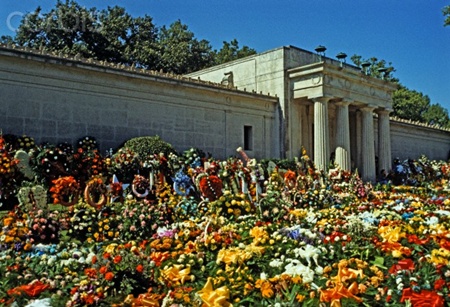 |
ALAN FORTAS - "Elvis proved that to be poor and Southern did not mean you didn't count"
In a few short years almost single-handedly Elvis changed the attitudes of the world. Not only about sexuality and "race music," but about class barriers, taste, and Southerners themselves. To those who never knew or who had forgotten, Elvis proved that to be poor and Southern did not mean you didn't count.
When he died, country music, once the voice of the Southern working class and the illiterate, was well on its way to mass acceptance all around the world. The surprise was that his death was a catharsis not just for the poor or the working class of the South, but also for the middle class of the East, the West, the North.
Elvis was simply an immensely talented, intensely troubled man. No saint. No satyr. Elvis's life was a dream with no way out but the end. Yet, for me, it will never be over. Like everybody else, I still miss him.
But for better or worse, I also have a part of Elvis inside of me. Everybody wants a touch of Elvis. And nobody wants to let go.
LAMAR FIKE - "The way Elvis was doing everything. You just can’t keep going like that."
Elvis never thought of himself as a pioneer. He didn’t understand the term. He just happened to be there. Elvis used to say, “There’s room for everybody in this business” - and there was. He used to tell artists that. He’d say, “Hey, don’t worry about me. Worry about yourself.”
Everybody out there today that’s in rock ‘n’ roll owes their career to Elvis. He was a nova exploding off of the old star and becoming thousands of times brighter than the original, and the brightness lights up everything around. He was a child of destiny, regardless of whether he wanted it or not.
I was with Elvis for 23 years. I talked to him the day before he died while we were setting up his next tour. I don’t think Elvis had any inkling he was going to die. His mother’s side of the family was so short-lived that, you know, the indications were all there. The way he was doing everything. You just can’t keep going like that. Nobody can keep going like that.
Then all of a sudden, I lost him. It was just devastating. You don’t get over that easily.
When I lost Elvis, it was as hard as losing my Father. It was devastating. I still do things today that come from being with Elvis. I unconsciously do stuff. Somebody likes one of my watches, I’ll take it off and give it to them.
I still miss Elvis. My god, I miss him every day of my life. Forty years on it’s something that goes on every day. I still dream of Elvis every day of my life since he passed. The intensity of 23 years with somebody is pretty strong.
JOE ESPOSITO - "Elvis was the most extraordinary ordinary man"
Elvis was not only blessed with unparalleled singing and performing gifts, he was extraordinary in his kindness, generosity, and insight. Elvis made it easy for us to forget who he was to the world.
One afternoon, I was painting fences with him on the ranch. Then, a few days later, he was performing for almost sixty thousand people at the Houston Astrodome.
"Oh-my-God!" I'd thought. "I forgotten who this guy is!"
Almost everyone who knew the man felt the same way. Every one of us felt close to Elvis and, even more pertinent, we each knew that he understood us in a way no one else did.
Elvis enjoyed his privileges fully and he was grateful. But he never forgot who he was and where he'd come from. He tried to use those gifts to make himself and others happy. If he showed any favouritism at all it wasn't to the wealthy and powerful, but to the needy and helpless.
Elvis was a good guy, there was no harm in Elvis, but there was an awful lot of love.
Elvis was happiest when faced with a challenge, when he didn't know if he could make it or not. Who knew that after eight years of making movies, people would accept him again in his 1968 comeback special? The next year, he walked onto a Las Vegas stage - his first live concert in the town where he had bombed many years earlier—and he inaugurated the most successful phase of his career.
Elvis lived to make people happy, and he himself was happiest when he brought joy to someone else. I wish there was a way all the good he has done with his gifts throughout the world could be measured.
Not a day goes by without mention of his name. Over four decades after his death, Elvis Presley still reigns unchallenged as the King of rock 'n' roll, the greatest superstar the world has ever known.
The comfort and enjoyment his music still brings to millions every day is impossible to comprehend. His influence as a performer and as a humanitarian has touched untold millions of people. We can never compile exact statistics, but I believe Elvis Presley will forever remain one of the most inspirational and influential men the world will ever know.
Elvis was the most extraordinary ordinary man.
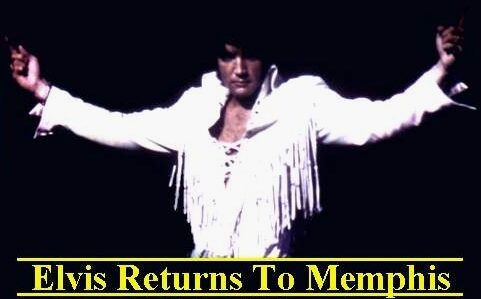 |
MARTY LACKER - "This world is a better place for Elvis having been here"
Elvis had an immense thirst for a knowledge of life, the meaning of it, and how it began.
He constantly read about religions and the supernatural. Elvis was curious about reincarnation and life after death. He had a great faith in God upon which he built his life, but he was in no hurry to find out what death was like.
Elvis was truly a remarkable and special human being. I am convinced that he was put on this earth for a special purpose, but he was just as much a human being as any of us.
He suffered from human faults and frailties. He had the material things about which people dream, but often they were not enough to make him happy.
The charisma and magnetism for which he was known was real. He had a smile that could turn the whole world on, and he had a strong hold over those who were associated with him.
It was hard to say no to Elvis, and there was no way I could tell him a lie. All he had to do was look at me and he would know immediately if I was trying to make him believe something that wasn't completely true. His eyes were probably the most expressive part of him.
They told us when he was happy, mischievous or angry.
Sometimes I thought he tried to change their expressions to hide his true thoughts, but he was never able to quite do it.
This world is a better place for Elvis Presley's having been here, and I know that as long as there is one of us alive, whose life he touched, he will still be alive, but I miss him.
I miss the years of kindness and the years of love, and Elvis had a lot of love for all of us.
I remember, God how I remember, the happy days of companionship, the days when we felt so very close to each other.
Ain't it funny how time slips away?
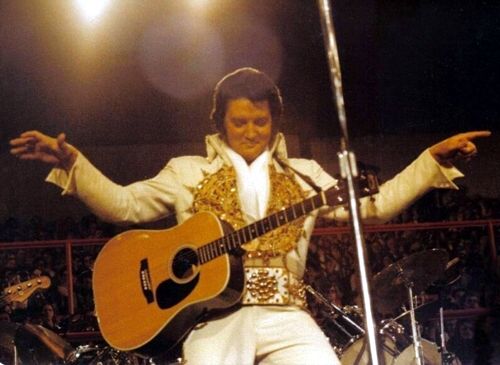 |
LARRY GELLER - "We're all going back home... someday"
Lonely rivers flow to the sea, to the sea,
To the open arms of the sea.
Lonely rivers sigh, wait for me,
wait for me.
I'll be coming home, wait for me.
From the first time I heard Elvis sing this song in early 1977, I had the strangest feeling that he was singing to his mother. It was as if somewhere deep in his soul he knew he'd be going home soon.
There was an indescribable aura around Elvis when he sang "Unchained Melody," something I'd never experienced before, something I know was felt by everyone in the audience.
A lone spotlight beamed on Elvis in the darkened concert hall. The only sound was his voice and the piano he was playing. The musicians were silent; the whole audience seemed to be holding their breath. Everyone was transfixed.
I never heard his voice so vibrant, so resonant, as if his very soul was crying out.
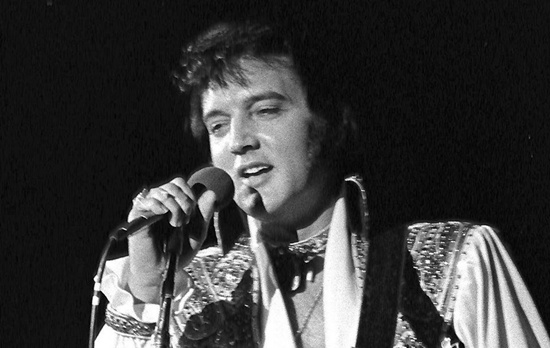 |
A little over ten years earlier, upstairs in Elvis' bedroom at Graceland, he and I were talking about his mother's passing in 1958. It was the most turbulent, disoriented and confusing time in his life: drafted into the Army, leaving the career that had exploded two years earlier, uncertain what the future would bring.
Elvis became very quiet, lost in his memories.
"My mother was the light of my life, my best friend; I mean, she's the one I could always go to ... man, that's a blow you can never really get over.
I can still hear her voice telling me just like it was yesterday, "Honey, God took your little brother back home to Heaven 'cause it was part of His plan. He has a plan for everybody: for your daddy, for me... and for you too, Elvis. Someday I'll be goin' back home, and someday Daddy's gonna go home. And even someday a long, long time from now - God's gonna bring you home, too. And then we'll all be together again, all of us back home in heaven.”
Elvis looked at me intently. He leaned forward and with conviction in his voice, said, "And that's exactly what I believe, we're all going back home... someday."
The candlelight vigil on the anniversary of his passing is an event that takes place nowhere else in the celebrity world. The solemn procession of flickering candles advances slowly in the dark, past rows of wreaths and flowered sculptures from fans around the world, as echoes of Elvis play softly in the background.
The lights move through the Meditation Garden, carried by tens of thousands of people from children to the elderly, many placing flowers or teddy bears on his grave. Some are weeping, some are seeking physical or spiritual healing; all are seeking a connection to Elvis. An eternal flame is burning.
The atmosphere is mystical, more akin to a pilgrimage to a holy shrine or a visit to a loved one's grave than adulation of a celebrity.
The people sense there is more to him than they know, an honesty and innocence that shone through the glitz and glamour.
They seem to understand how much he cared about them, too.
Elvis, like all of us, lives on in the memories of those who love him. |
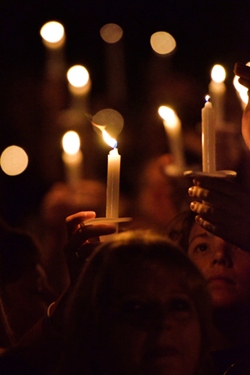 |
Spotlight by Piers Beagley
-Copyright EIN August 16th 2022. Do Not reprint or republish without permission.
Click here to comment on this article
ELVIS Forever 2021: Four decades after his death, Elvis Presley still reigns unchallenged as the King of rock 'n' roll, the greatest superstar the world has ever known.
All the tabloid media reports and old rumours can't change the fact that there never was anyone like him and there never will be an other again.
Elvis was the most extraordinary ordinary man.
Joe Esposito would be with Elvis to the very end...
EIN looks at Joe Esposito's final memories and ELVIS Forever, forty-four years on.
(Spotlight, Source;ElvisInfoNetwork) |
 |
ELVIS Forever - 2019: - August 16th, 1956, Elvis arrived on board an American Airlines flight to Los Angeles International airport in order to start work on his first film role, The Reno Brothers soon to be renamed 'Love Me Tender'.
Elvis was only 21 years old and at the start of his incredible trajectory to become the world's biggest superstar.
Little did Elvis know that he was already halfway through his all too-short life on earth.
In the same month Elvis would tell fans, "I've been lucky. You know something? I just feel sometimes like it's all a dream, like I'll rub my eyes and wake up and it will be over. I hope not. I hope it never happens. I hope it never ends"
Sadly, just 21 years later, it would end far too soon.
Forty two years on we all are once again thinking about tragic end to Elvis' incredible life and how much he did for us in his all too short life-time.
|
 |
